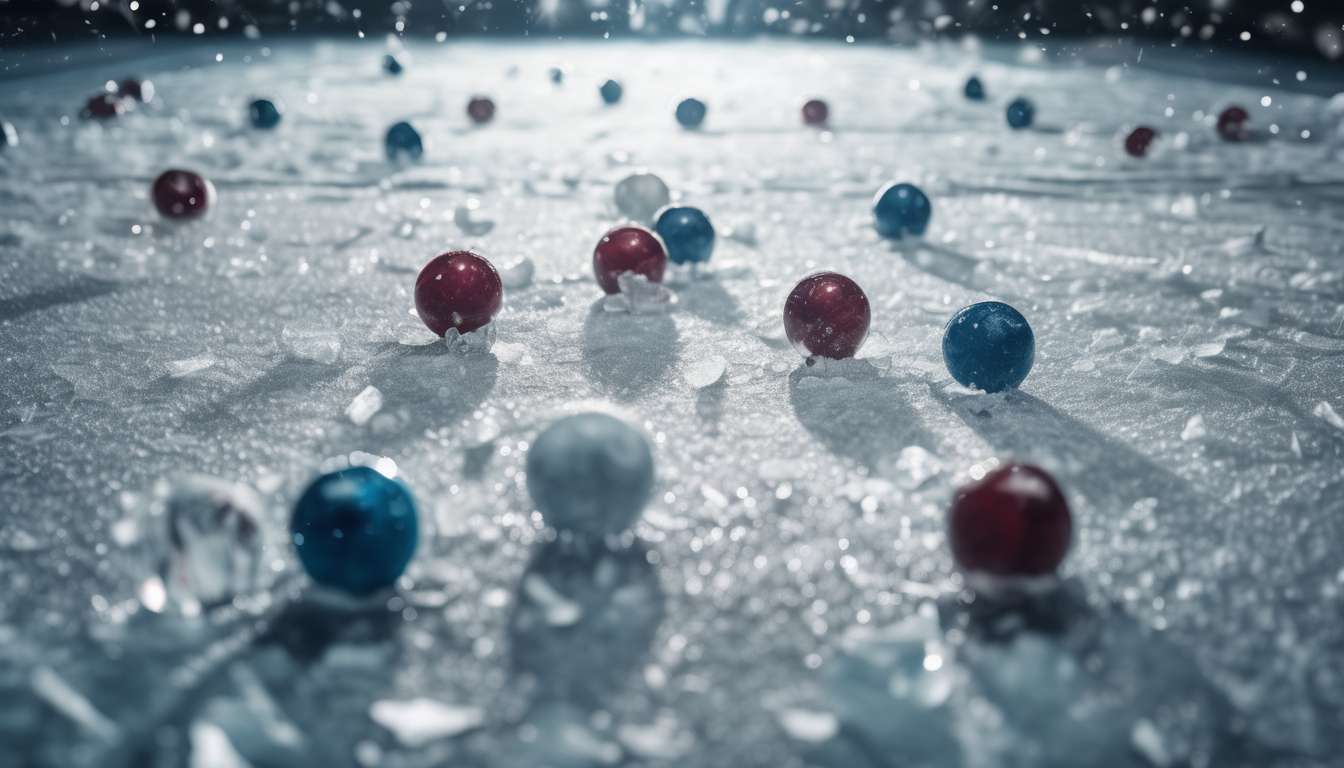As avid fans and analysts of hockey, we find ourselves constantly surrounded by a whirlwind of predictions and speculations. It’s part of the thrill, blending our passion for the game with the excitement of forecasting outcomes.
However, amid the chatter, we often encounter persistent myths that cloud our judgment and mislead even the most seasoned enthusiasts. We’ve all heard them—those seemingly logical assumptions about player performances, team dynamics, and game outcomes. But how many of these are based on solid evidence, and how many are simply misconceptions perpetuated over time?
In this article, we aim to set the record straight, debunking five common hockey prediction myths that have long influenced our understanding of the sport. By dissecting these myths, we hope to provide clarity and enhance our appreciation of the game, empowering us to make more informed predictions that truly reflect the unpredictable nature of hockey.
Key Myths to Debunk:
-
Myth of Momentum: The belief that a team with recent wins will continue to win indefinitely.
-
Home Advantage Fallacy: The assumption that playing on home ice guarantees a win.
-
Star Player Dependence: The idea that a single star player can consistently carry a team to victory.
-
Rookie Underestimation: The notion that rookies cannot make a significant impact in crucial games.
-
Penalty Bias: The misconception that teams with more penalties are more likely to lose.
By breaking down these myths, we aim to foster a deeper, more nuanced understanding of the complexities involved in predicting hockey outcomes.
Dissecting the Myth of Momentum
Many fans and analysts swear by the concept of momentum in hockey, but it’s worth examining whether it truly impacts the game. We often hear about a team riding high on momentum, turning the tides during a match. However, is it really as powerful as we think?
While it’s thrilling to believe in the invisible force that propels our favorite team to victory, the reality might be more complex. The unpredictability of hockey showcases how momentum can be fleeting, shifting with a single save or a sudden goal.
Consider the home advantage:
- We might assume that a team playing on familiar ice, buoyed by cheering fans, would naturally maintain momentum.
- Yet, unexpected outcomes remind us that momentum doesn’t guarantee success.
In fact, the very nature of hockey, with its fast-paced shifts and rapid changes, often defies the notion of sustained momentum.
Let’s embrace the unpredictability that makes every game exciting and remember that momentum, though enticing, isn’t always the decisive factor.
Unveiling the Home Advantage Fallacy
Many of us instinctively believe that playing on home ice provides a significant edge, but let’s examine whether this advantage truly holds up under scrutiny.
We often associate familiar surroundings and supportive fans with an increased likelihood of success. However, the reality is more complex. While a home crowd can generate momentum, lifting players’ spirits, it doesn’t guarantee victory. Unpredictability often reigns supreme in hockey, where the bounce of a puck, a referee’s call, or a sudden shift in energy can swing a game.
Our analysis shows that while home teams might win slightly more often, this isn’t solely because of location. Factors like:
- Team strategy
- Player health
- Travel fatigue
play crucial roles.
Embracing the unpredictability of each game reminds us that while home advantage may contribute, it’s not the definitive factor many of us assume. Let’s unite in understanding that the thrill of hockey lies in its uncertainty, where any team can triumph, anywhere.
Challenging Star Player Dependence
Many fans assume that a team’s success hinges primarily on its star players, but let’s explore how depth and strategy often play an equally crucial role.
We can’t overlook the power of momentum in hockey. While star players can certainly ignite a spark, it’s the collective effort and resilience of the entire team that sustains a winning streak. When we focus too much on a single player’s performance, we miss the unpredictability that makes hockey exciting.
Star players might grab headlines, but it’s the:
- Strategic rotations
- Line changes
that keep opponents guessing.
We’ve also seen how a strong home advantage can rally an entire team, not just the stars. The crowd’s energy enhances performance, creating an atmosphere where every player feels like a vital piece of the puzzle.
In the end, success lies in balancing:
- Individual brilliance
- Team unity
Let’s appreciate the depth and strategy that drive a team forward, making every game a true team effort.
Debunking Rookie Underestimation
Many fans underestimate rookies, but their fresh energy and potential can significantly impact a team’s dynamics and success. We’ve all seen how a rookie’s unpredictability can catch opponents off guard, creating momentum that might just turn the tide of a game.
Young players often bring an unexpected spark, surprising seasoned veterans and fans alike. Their hunger to prove themselves can lift the team, especially when playing on home ice, where their enthusiasm and drive can electrify the crowd and further enhance the home advantage.
As a community, we should embrace the rookies’ potential and appreciate how their unique contributions can lead to unexpected victories. While veterans provide experience, rookies offer a new perspective that can be crucial in tight matches.
Let’s not forget how often we’ve seen rookies step up in critical moments, defying predictions and altering the course of a season. Together, as fans, we should celebrate and support these emerging talents, recognizing their role in shaping the future of hockey.
Exposing Penalty Bias Misconceptions
Many fans believe that referees consistently favor one team over another when calling penalties. Let’s explore the data to understand if this bias really exists.
Home Advantage:
- We often hear that home advantage might sway a referee’s decisions.
- Studies show that while home teams sometimes receive fewer penalties, it’s not significant enough to confirm a consistent bias.
Influence of the Crowd:
- The influence of the cheering crowd can’t be denied.
- However, it’s the unpredictability of the game that keeps us on our toes.
Role of Momentum:
- Momentum plays a crucial role as teams might commit fewer penalties when they’re riding high on energy and confidence.
Perception vs. Reality:
- It’s easy to perceive bias when calls don’t go our way.
- We must remember that referees are only human, subject to the same unpredictability that fuels the game we love.
Embracing Uncertainty:
- As fans, embracing the game’s uncertainties can enhance our sense of belonging in this vibrant community.
- Every twist and turn adds to the excitement of hockey.
Beyond the Numbers: Team Chemistry
Let’s delve into how team chemistry, often overlooked, plays a vital role in a team’s success beyond just the numbers.
When we watch our favorite teams, we’re not just observing individual statistics. We’re witnessing the magic that unfolds when players sync with one another, creating an unstoppable force. Team chemistry fuels momentum, allowing players to anticipate each other’s moves and maintain pressure on opponents.
This synergy becomes especially potent when combined with the home advantage. The familiar environment and supportive crowd amplify the team’s confidence, making them formidable.
Moreover, strong team chemistry introduces a layer of unpredictability. Opponents find it challenging to prepare against a team that operates like a well-oiled machine, constantly adapting and surprising with seamless coordination. This unpredictability often tilts the game in favor of teams that might not seem dominant on paper.
When we look beyond mere numbers, we realize how essential chemistry is in predicting a team’s success. We’re all part of this exhilarating journey together.
The Impact of Coaching Strategies
Effective coaching strategies can be the game-changer that transforms a team from good to great. As hockey enthusiasts, we know the thrill of witnessing a coach’s tactical brilliance unfold on the ice. When a coach adapts strategies to harness momentum, the whole team feels the surge of energy. We can sense it in the air—it’s that feeling when our team turns the tide in their favor.
Playing at home offers more than just familiar surroundings; it’s a strategic advantage that coaches capitalize on. Our collective spirit as fans can boost our team’s confidence, creating an atmosphere where they perform at their best. With the right strategies, coaches turn this home advantage into a fortress that’s tough for opponents to breach.
Unpredictability in hockey is always lurking. A skilled coach embraces this, developing flexible strategies that allow the team to adapt quickly.
Together, we thrive on this unpredictability, knowing our coach has prepared us for any challenge.
Unraveling the Unpredictability of Hockey
In the ever-changing world of hockey, uncertainty is the only constant, challenging both players and fans to embrace the unexpected. We all gather around the rink, hoping our predictions will hold true, yet knowing that hockey’s charm lies in its unpredictability.
Momentum can shift in the blink of an eye; a single goal can turn the tide of a game, leaving us on the edge of our seats.
Let’s not forget the mysterious power of home advantage. We cheer louder, hoping our collective energy propels our team forward. But even this familiar edge can waver under the weight of the game’s inherent chaos. Despite our best efforts, we can’t always predict how the puck will bounce or which way the wind will blow.
Together, we celebrate the shared experience of uncertainty. It’s this unpredictability that binds us, creating unforgettable memories and thrilling moments. In hockey, we’re all part of the same unpredictable journey.
What are the key differences between hockey prediction models and those used in other sports?
When it comes to hockey prediction models versus those in other sports, the key differences lie in the unique variables that impact the game.
In other sports, prediction models often focus heavily on:
- Individual player performance.
- Historical statistics.
- Game-specific conditions.
In contrast, hockey prediction models must consider:
- The dynamic nature of team play.
- Constant changes in line combinations.
- The fast-paced nature of the game.
Understanding these nuances allows for the creation of more accurate predictions that capture the essence of hockey’s unpredictability.
By acknowledging these unique aspects, prediction models can better reflect the realities of hockey, leading to improved forecasting accuracy.
How do weather conditions influence the outcome of outdoor hockey games?
When it comes to outdoor hockey games, weather conditions can play a significant role in determining the outcome.
Factors such as:
- Wind
- Temperature
- Ice quality
can all impact the players’ performance and strategy.
Teams need to adapt quickly to the changing conditions to stay competitive. It’s a reminder that nature can be an unpredictable opponent, adding an exciting element to the game that keeps us on our toes.
What role does fan attendance play in a team’s performance during the season?
Fan Attendance and Team Performance
Fan attendance significantly impacts a team’s performance during the season. When fans show up and cheer passionately, it creates a powerful energy that motivates players to perform their best.
Benefits of Fan Support:
- Boosts morale
- Increases player confidence
- Fosters a strong sense of unity within the team
Teams often thrive off the enthusiasm of their fans, turning home games into an advantage that can influence the outcome of matches.
Conclusion
In conclusion, debunking these common hockey prediction myths opens up a new perspective on the game.
Understanding the nuances beyond momentum, home advantage, and star player dependence can enhance your predictions. Remember, rookie potential and penalty biases are not always as they seem.
Embrace the unpredictability of hockey with a critical eye:
- Look beyond statistics to appreciate the impact of team chemistry and coaching strategies.
Stay informed, stay sharp, and enjoy the game for all its surprises.

